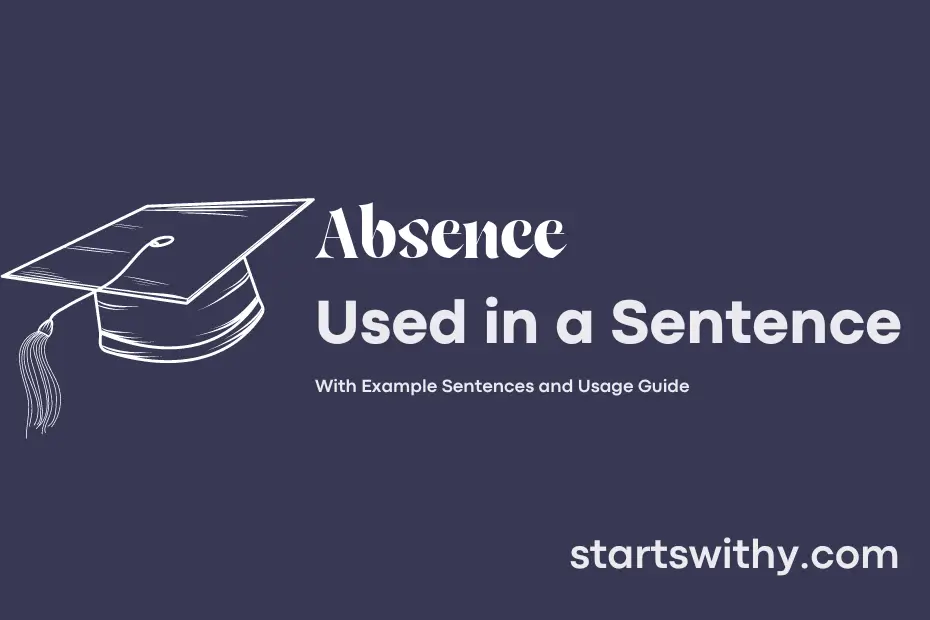Have you ever struggled with understanding the concept of “absence” in a sentence? In linguistics, the term “absence” refers to the state of something not being present or included in a particular context.
It is essential to recognize how the absence of a specific element can impact the meaning and structure of a sentence. By exploring examples and understanding how absence works in language, we can deepen our comprehension of sentence construction and communication.
7 Examples Of Absence Used In a Sentence For Kids
- Absence means not being present.
- We should inform our teacher about our absence from school.
- Let’s make sure to check the attendance to avoid absence issues.
- It’s important to have a valid reason for your absence.
- Remember to submit a note explaining your absence.
- Missing class can lead to absence from the fun activities.
- We should try to reduce absence by staying healthy.

14 Sentences with Absence Examples
- Absence of proper time management skills can lead to academic difficulties for college students.
- Many students feel overwhelmed by the absence of a proper support system during their college years.
- The absence of clear communication between students and professors can cause misunderstandings.
- The absence of motivation can hinder a student’s ability to excel in their studies.
- Absence of adequate resources in the library can make research assignments challenging for students.
- Students often struggle with the absence of a healthy work-life balance in college.
- The absence of practical experience can make it difficult for students to secure internships.
- Mental health issues can be exacerbated by the absence of proper counseling services on campus.
- The absence of extracurricular activities can make college life dull and unfulfilling for students.
- For international students, the absence of familiar food options can be a source of discomfort.
- The absence of timely feedback from professors can make it hard for students to improve their academic performance.
- Financial constraints can lead to the absence of necessary study materials for some students.
- Late submission of assignments due to the absence of time management skills can result in lower grades.
- The absence of career guidance and networking opportunities can make it challenging for students to find employment post-graduation.

How To Use Absence in Sentences?
To use Absence in a sentence, first identify a situation where something is missing or not present. For example, “She noticed the absence of her keys and realized she must have left them at home.”
Next, place the word Absence in your sentence at a point where it clearly highlights the fact that something is missing. You can use it at the beginning, middle, or end of your sentence depending on how you want to emphasize the absence of something. For instance, “In the absence of clear instructions, the team was unsure how to proceed.”

Remember that Absence is a noun, so it should be used to refer to the state of something being missing or not there. It cannot be conjugated like a verb or used to describe an action. For example, you wouldn’t say “She absenced from the meeting,” but rather “She was noticed for her absence from the meeting.”
It’s important to use Absence thoughtfully in your sentence to clearly convey the idea that something is missing. Try to provide context or details to help the reader understand what is not present or what is lacking. With practice, you’ll become more comfortable incorporating Absence into your writing to effectively communicate the absence of something in a clear and concise manner.
Conclusion
In conclusion, the examples of sentences with the keyword “absence” illustrate its usage in conveying the lack or nonexistence of something. Whether referring to the absence of a loved one, a key ingredient in a recipe, or a necessary component in a system, these sentences effectively demonstrate how the word can be employed in various contexts to indicate the state of something not being present.
By examining how “absence” is integrated into different sentences, it becomes clear that the word is a versatile tool for highlighting what is missing or omitted. Through these examples, we see how “absence” contributes to the clarity and specificity of language, allowing for clear communication of the idea of something not being there.



